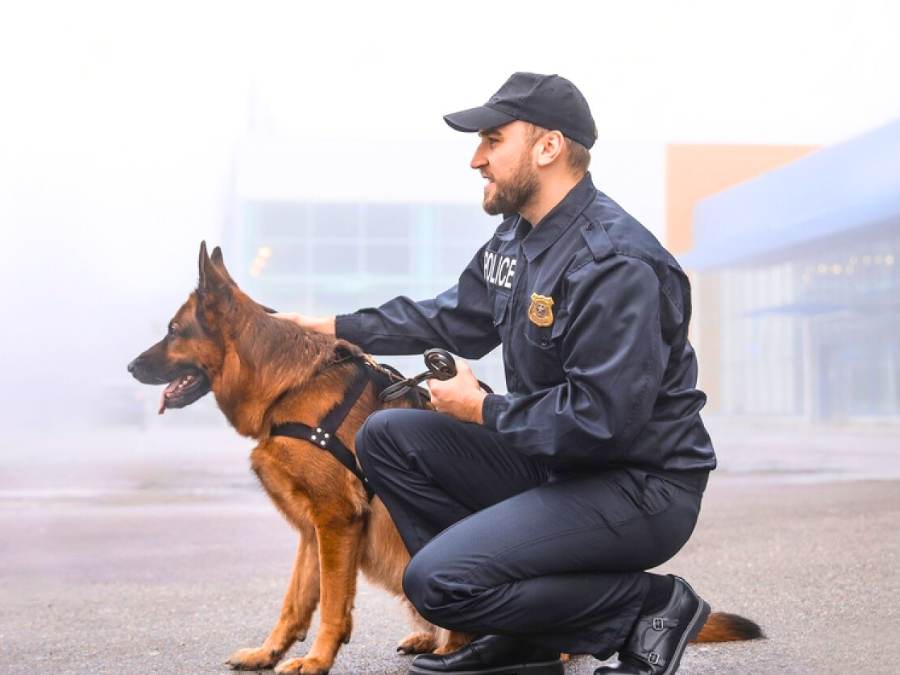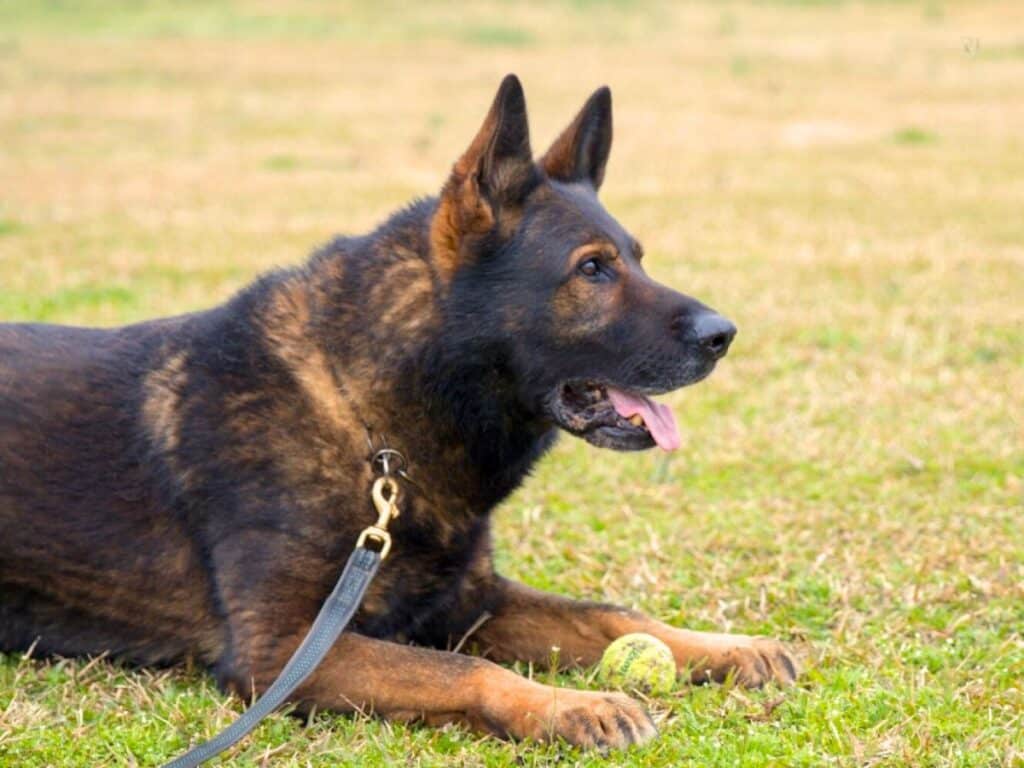German Shepherds are extensively used as police dogs due to their remarkable blend of intelligence, agility, and loyalty. These traits make them exceptionally adaptable to a variety of roles within law enforcement, including search and rescue missions, narcotics detection, and suspect apprehension.
Their intelligence allows for high trainability, enabling them to learn and execute complex commands, while their agility ensures they can navigate challenging environments with ease.
German Shepherds are not just pets or companions; they are highly skilled professionals trained to perform a variety of critical tasks in policing. From sniffing out illegal substances to tracking lost individuals, their contributions are invaluable.
This blog post delves into why German Shepherds have become the preferred choice for police dogs, exploring their history, unique characteristics, rigorous training, diverse roles, and the challenges they face in the line of duty.
Why Are German Shepherds Used as Police Dogs?
There are personality traits that a dog needs to possess to be a successful police dog, and German Shepherds possess such traits in abundance.
German Shepherds are used as police dogs because they possess the following traits:
- Intelligence: Ability to learn and execute complex commands efficiently.
- Agility: Physical capability to navigate through challenging environments.
- Loyalty: A strong bond with their handler for effective teamwork.
- Courage: Willingness to face dangerous situations without hesitation.
- Strong Work Ethic: Eagerness to work and perform tasks consistently.
- Obedience: Compliance with the handler’s commands, even in stressful situations.
- Sense of Smell: Exceptional olfactory abilities for detection work.
- Physical Strength: Adequate strength for apprehending suspects and enduring long working hours.
- Endurance: Stamina for long shifts and to maintain performance over time.
- Social Temperament: Ability to interact positively with people and animals when required.
- Adaptability: Flexibility to work in various settings and conditions.

How Did German Shepherds Become Police Dogs?
The German Shepherd breed was officially established in 1899 by Max von Stephanitz, a former German cavalry captain who admired the intelligence and working capabilities of German herding dogs.
The breed’s journey towards becoming a staple in police and military work began in its homeland, Germany. In the early 20th century, German Shepherds were recognized for their work ethic, intelligence, and obedience, making them ideal candidates for military and police work.
During World War I, they served various roles, including delivering messages, assisting the Red Cross, and acting as guard dogs.
Following the war, the breed’s popularity soared internationally. Law enforcement agencies worldwide began to take note of the German Shepherd’s successes on the battlefield and at home.
In the 1920s, the first police dog training schools were established in Germany, setting the foundation for the use of German Shepherds in police work globally.
Role of German Shepherds as Police Dogs
German Shepherds serve in a wide array of roles within law enforcement agencies, demonstrating remarkable versatility and effectiveness.
Patrol Duties
- Presence and Deterrence: German Shepherds often accompany police officers on patrol, providing a visible deterrent to criminal activity.
- Search and Clear Operations: They are deployed in search and clear operations, especially in scenarios involving suspects hiding within buildings or difficult terrain.
Detection Work
- Narcotics Detection: Trained in recognizing specific drug odors, German Shepherds are extremely good at helping to identify and seize illegal substances. (Study)
- Explosive Ordinance Detection: In counter-terrorism efforts, these dogs are trained to detect explosives, providing a critical layer of security in public spaces, events, and during specific threats.
- Search for Contraband: Beyond drugs and explosives, German Shepherds assist in locating other forms of contraband, including illegal firearms and currency, aiding in broader law enforcement efforts.
Search and Rescue Missions
- Missing Persons: Leveraging their tracking abilities, German Shepherds are often at the forefront of search and rescue operations for missing persons.
- Disaster Response: Following natural disasters, German Shepherds assist in locating survivors trapped in rubble or otherwise inaccessible areas, saving lives in critical time windows.
Apprehending Suspects
- Pursuit and Detainment: When suspects flee, German Shepherds can be deployed to pursue and safely detain them until officers can take over.
- Protection: In dangerous situations, German Shepherds are trained to protect their handlers and other law enforcement personnel, acting as a formidable barrier against aggression.
Specialized Roles
- K9 Units Special Operations: Some German Shepherds are part of specialized K9 units that tackle specific crimes, such as gang violence or human trafficking, utilizing their unique skills in concert with other law enforcement strategies.

How Are German Shepherds Trained as Police Dogs?
The exceptional abilities of German Shepherds make them natural candidates for police work, but it’s their rigorous training that truly prepares them for the challenges of the job.
Basic Obedience Training
- Foundation: The journey begins with basic obedience training, where dogs learn to follow commands such as sit, stay, come, and heel.
- Socialization: Early socialization is part of basic training, exposing the dog to various environments, sounds, people, and other animals.
Specialized Police Training
After mastering basic obedience, German Shepherds undergo specialized training tailored to their future roles in law enforcement. This training is intensive and requires a significant commitment from both the dog and the handler.
- Detection Work: Dogs trained in detection work learn to identify specific substances like drugs, explosives, or accelerants. Training involves associating a target scent with a positive reward, gradually teaching the dog to alert their handler to the presence of the scent.
- Search and Rescue: For search and rescue missions, training focuses on tracking and locating missing persons. Dogs learn to follow human scent trails over varied terrains and in different environmental conditions.
- Apprehension and Protection: Apprehension training teaches German Shepherds to safely and effectively detain suspects under the command of their handler. This includes bite work, control, and the ability to release on command.
Advanced and Ongoing Training
- Environmental Conditioning: German Shepherds are exposed to a range of environments to ensure they can perform under any conditions. This includes busy urban areas, dense forests, and even navigating obstacles.
- Scenario-Based Training: Realistic training scenarios that simulate actual police work are crucial for preparing German Shepherds for the field. These scenarios help dogs apply their skills in a controlled, yet realistic, setting.
- Ongoing Training: Training doesn’t stop once a German Shepherd becomes an operational police dog. Continuous training is essential for maintaining skills, learning new techniques, and ensuring the dog remains effective throughout its service.
Certification
- Standards and Certification: German Shepherds and their handlers must meet specific standards and obtain certification before being deployed in the field. Certifications can be specific to the dog’s role, such as detection or search and rescue, and must be regularly renewed to ensure ongoing proficiency.
The training of a police German Shepherd is a comprehensive process that requires dedication, patience, and a deep understanding of the dog’s capabilities and needs.

Are All Police Dogs German Shepherds?
No, not all police dogs are German Shepherds. While German Shepherds are among the most popular breeds used in police work due to their versatility, intelligence, and physical capabilities, several other breeds are also commonly employed in various law enforcement roles. These include, but are not limited to:
- Belgian Malinois
- Labrador Retriever
- Bloodhound
- Dutch Shepherd
- Boxer
- Springer Spaniel
- Rottweiler
- Doberman
- Giant Schnauzer
Each breed brings its own set of strengths and specialized skills to the table, and the choice of breed often depends on the specific requirements of the task or the preferences of the law enforcement agency.
Can Female German Shepherds Be Police Dogs?
Yes, female German Shepherds can and do serve as police dogs. The selection of a dog for police work typically depends more on the individual dog’s temperament, health, abilities, and training rather than its gender.
Female German Shepherds may have some differences in size and strength compared to their male counterparts, but these differences do not significantly impact their effectiveness as working dogs.
In fact, some handlers and trainers may prefer female German Shepherds for certain roles due to their focus, agility, and sometimes easier manageability.

German Shepherd Police Dog Adoption
Adopting a retired German Shepherd police dog can be a rewarding experience, offering a loving home to a dog that has served the community. These canines, known for their loyalty, intelligence, and dedication, often seek a peaceful retirement after years of demanding work in law enforcement.
Adoption Process
- Retirement Criteria: German Shepherds usually retire from police work due to age, health issues, or decreased performance. The exact age or conditions for retirement can vary depending on the dog’s health and the policies of the law enforcement agency.
- Adoption Programs: Many police departments and specialized organizations have adoption programs for retired police dogs. These programs aim to place retired dogs in suitable homes where they can enjoy a comfortable retirement.
- Application and Screening: Potential adopters must typically undergo a thorough application and screening process. This process assesses the adopter’s ability to provide a suitable home, including understanding the unique needs of a retired police dog.
- Matching: Adoption coordinators strive to match retired police dogs with adopters based on the dog’s temperament, health needs, and the adopter’s lifestyle. This careful matching ensures a successful transition for the dog into its new home.
Considerations for Adopters
- Health and Activity Level: Retired police dogs may have health issues stemming from their rigorous work life. Adopters should be prepared for possible medical expenses and understand that these dogs may not be as active as they once were.
- Behavioral Adjustment: Transitioning from a working environment to a domestic one can be challenging for some dogs. Adopters need patience and understanding as the dog adjusts to its new life.
- Training and Socialization: While retired police dogs are well-trained, adopters may need to provide additional training to help them adapt to non-working roles and ensure they can interact safely with other pets and people.
Adopting a retired German Shepherd police dog is a noble and compassionate act that can bring immense joy and fulfillment.
Final Remarks
As we look to the future, the use of German Shepherds in police work is likely to evolve with advances in training methods and a deeper understanding of canine behavior. Yet, the core reasons for their selection as police dogs—characterized by their exceptional attributes and the wide array of roles they can fulfill—will undoubtedly ensure their continued presence in law enforcement efforts worldwide.




